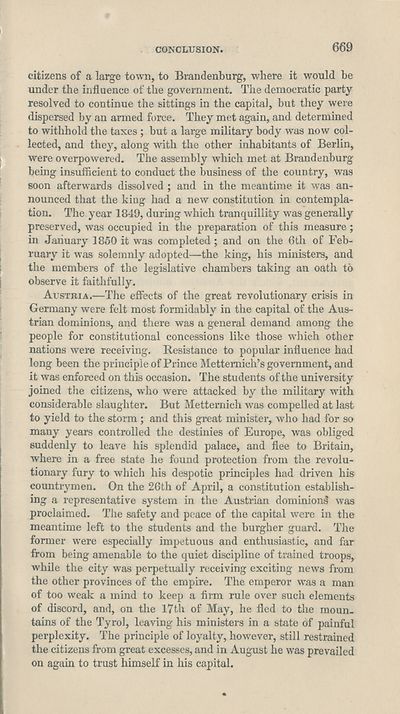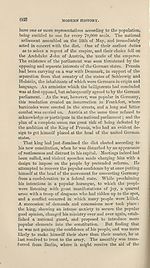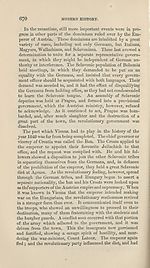Download files
Complete book:
Individual page:
Thumbnail gallery: Grid view | List view

CONCLUSION.
citizens of a large town, to Brandenburg, where it would be
under the influence of the government. The democratic party
resolved to continue the sittings in the capital, but they were
dispersed by an armed force. They met again, and determined
to withhold the taxes ; but a large military body was now col¬
lected, and they, along with the other inhabitants of Berlin,
were overpowered. The assembly which met at Brandenburg
being insufficient to conduct the business of the country, was
soon afterwards dissolved ; and in the meantime it was an¬
nounced that the king had a new constitution in contempla¬
tion. The year 1849, during which tranquillity was generally
preserved, was occupied in the preparation of this measure ;
in January 1850 it was completed; and on the 6th of Feb¬
ruary it was solemnly adopted—the king, his ministers, and
the members of the legislative chambers taking an oath to
observe it faithfully.
Austria.—The effects of the great revolutionary crisis in
Germany were felt most formidably in the capital of the Aus¬
trian dominions, and there was a general demand among the
people for constitutional concessions like those which other
nations were receiving. Resistance to popular influence had
long been the principle of Prince Mettemich’s government, and
it was enforced on this occasion. The students of the university
joined the citizens, who were attacked by the military with
considerable slaughter. But Metternich was compelled at last
to yield to the storm ; and this great minister, who had for so
many years controlled the destinies of Europe, was obliged
suddenly to leave his splendid palace, and flee to Britain,
where in a free state he found protection from the revolu¬
tionary fury to which his despotic principles had driven his
countrymen. On the 26th of April, a constitution establish¬
ing a representative system in the Austrian dominion^ was
proclaimed. The safety and peace of the capital were in the
meantime left to the students and the burgher guard. The
former were especially impetuous and enthusiastic, and far
from being amenable to the quiet discipline of trained troops,
while the city was perpetually receiving exciting news from
the other provinces of the empire. The emperor was a man
of too weak a mind to keep a firm rule over such elements
of discord, and, on the 17th of May, he fled to the moun¬
tains of the Tyrol, leaving his ministers in a state of painful
perplexity. The principle of loyalty, however, still restrained
the citizens from great excesses, and in August he was prevailed
on again to trust himself in his capital.
citizens of a large town, to Brandenburg, where it would be
under the influence of the government. The democratic party
resolved to continue the sittings in the capital, but they were
dispersed by an armed force. They met again, and determined
to withhold the taxes ; but a large military body was now col¬
lected, and they, along with the other inhabitants of Berlin,
were overpowered. The assembly which met at Brandenburg
being insufficient to conduct the business of the country, was
soon afterwards dissolved ; and in the meantime it was an¬
nounced that the king had a new constitution in contempla¬
tion. The year 1849, during which tranquillity was generally
preserved, was occupied in the preparation of this measure ;
in January 1850 it was completed; and on the 6th of Feb¬
ruary it was solemnly adopted—the king, his ministers, and
the members of the legislative chambers taking an oath to
observe it faithfully.
Austria.—The effects of the great revolutionary crisis in
Germany were felt most formidably in the capital of the Aus¬
trian dominions, and there was a general demand among the
people for constitutional concessions like those which other
nations were receiving. Resistance to popular influence had
long been the principle of Prince Mettemich’s government, and
it was enforced on this occasion. The students of the university
joined the citizens, who were attacked by the military with
considerable slaughter. But Metternich was compelled at last
to yield to the storm ; and this great minister, who had for so
many years controlled the destinies of Europe, was obliged
suddenly to leave his splendid palace, and flee to Britain,
where in a free state he found protection from the revolu¬
tionary fury to which his despotic principles had driven his
countrymen. On the 26th of April, a constitution establish¬
ing a representative system in the Austrian dominion^ was
proclaimed. The safety and peace of the capital were in the
meantime left to the students and the burgher guard. The
former were especially impetuous and enthusiastic, and far
from being amenable to the quiet discipline of trained troops,
while the city was perpetually receiving exciting news from
the other provinces of the empire. The emperor was a man
of too weak a mind to keep a firm rule over such elements
of discord, and, on the 17th of May, he fled to the moun¬
tains of the Tyrol, leaving his ministers in a state of painful
perplexity. The principle of loyalty, however, still restrained
the citizens from great excesses, and in August he was prevailed
on again to trust himself in his capital.
Set display mode to:
![]() Universal Viewer |
Universal Viewer | ![]() Mirador |
Large image | Transcription
Mirador |
Large image | Transcription
| Antiquarian books of Scotland > Education > Elements of universal history on a new and systematic plan > (689) |
|---|
| Permanent URL | https://digital.nls.uk/127588408 |
|---|
| Description | Thousands of printed books from the Antiquarian Books of Scotland collection which dates from 1641 to the 1980s. The collection consists of 14,800 books which were published in Scotland or have a Scottish connection, e.g. through the author, printer or owner. Subjects covered include sport, education, diseases, adventure, occupations, Jacobites, politics and religion. Among the 29 languages represented are English, Gaelic, Italian, French, Russian and Swedish. |
|---|

